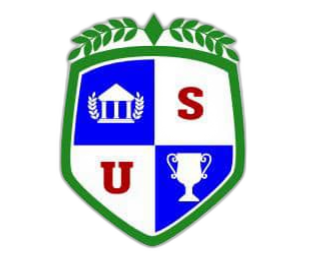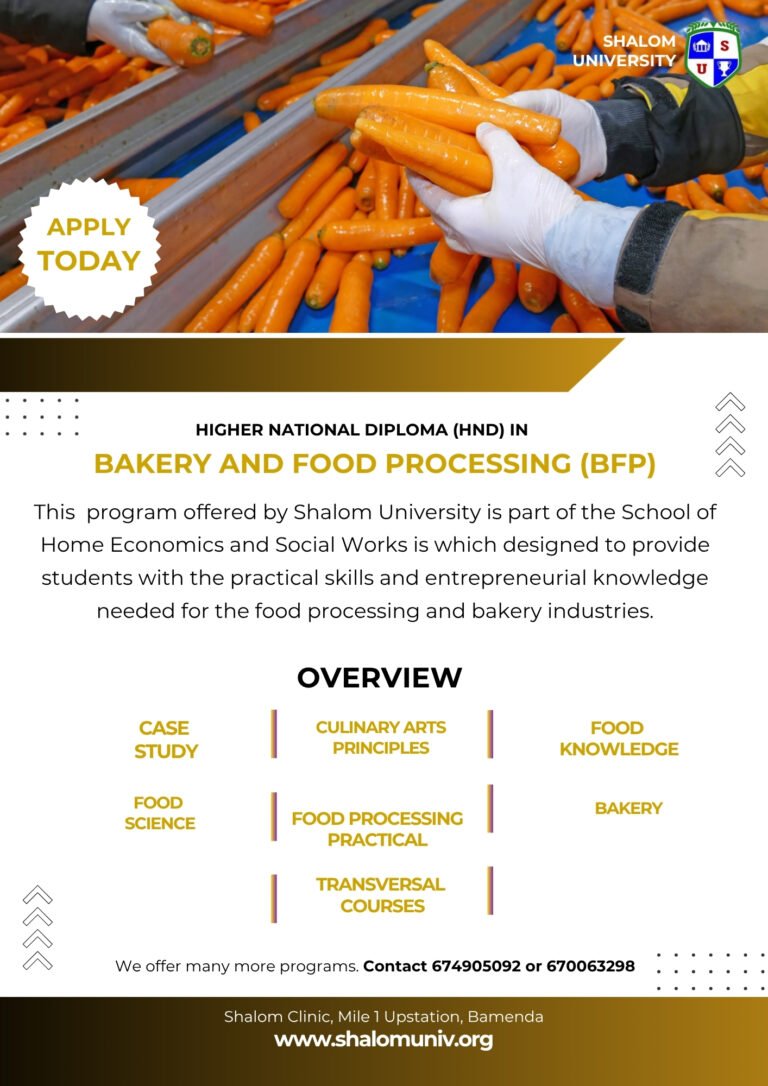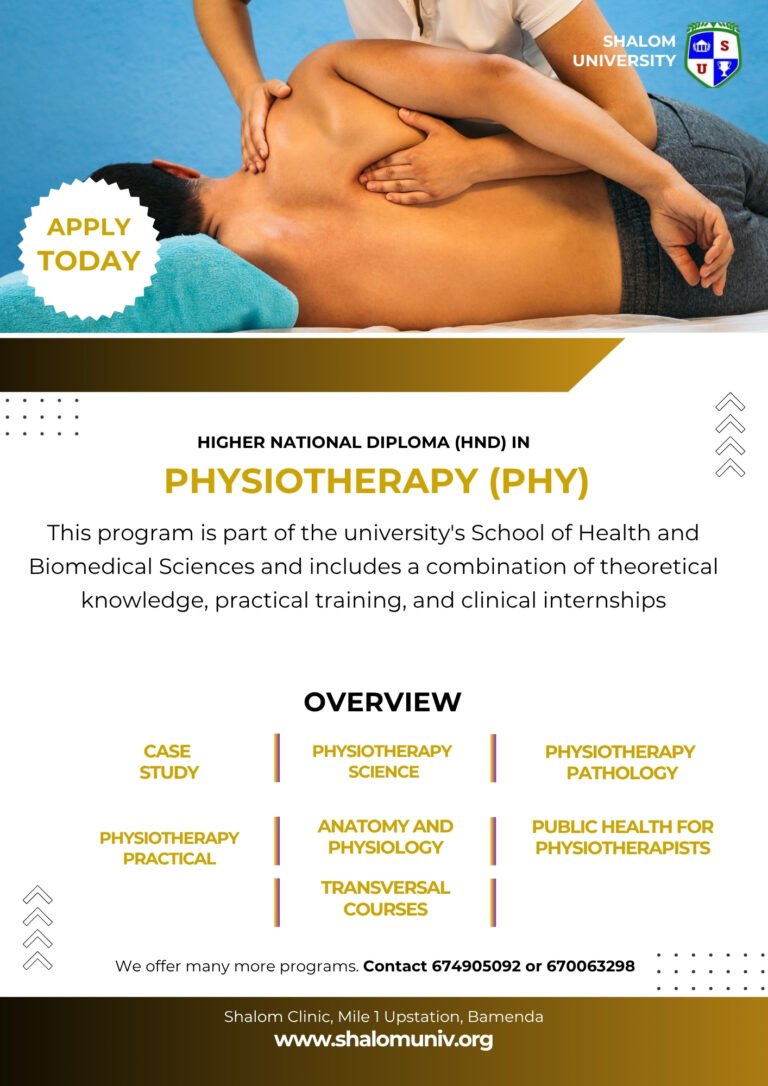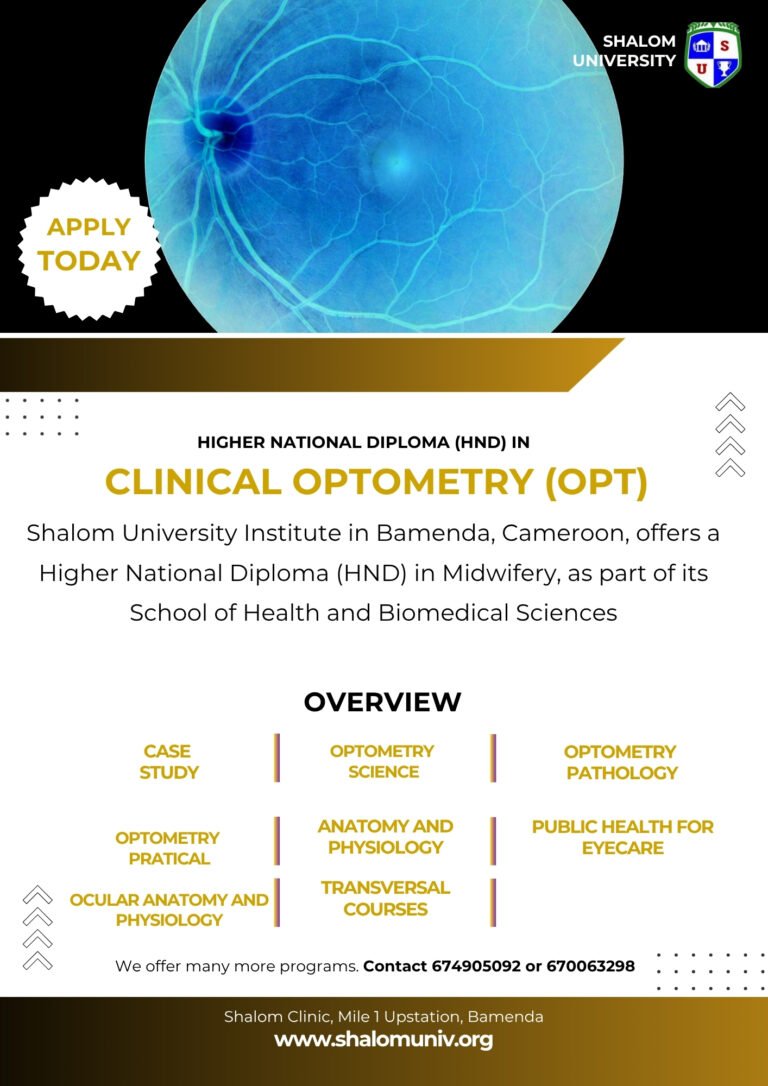For aspiring healthcare professionals in Cameroon, the path to a fulfilling career often begins with specialized, hands-on training that addresses the country’s unique health challenges. The HND in Pharmacy Technology at Shalom University in Bamenda offers a dynamic program for those aiming to play a vital role in managing and dispensing medication. This program is not just about counting pills; it is a comprehensive training experience that combines academic learning with practical experience, ensuring graduates are well-equipped to support pharmacists and serve patients across the nation.
Shalom University’s approach is deeply contextualized within the Cameroonian health system, preparing students for the realities of practice where adaptability and a strong scientific foundation are key. The curriculum is built to ensure a robust understanding of pharmaceutical principles, the practical skills of pharmacy operations, and the critical thinking necessary for patient safety.
The Pharmacy Technology Curriculum at Shalom University
The HND in Pharmacy Technology program at Shalom University is anchored by a set of core papers that provide a holistic and practical education.
Paper: Case Study
The Case Study paper is the capstone of the HND program, integrating all the theoretical knowledge and technical skills into a critical thinking and problem-solving exercise. It prepares students for the complex, real-world challenges they will face as pharmacy technicians. This is especially crucial in Cameroon, where pharmacy technicians often serve as the first point of contact for patients and must navigate diverse socioeconomic factors affecting medication access and adherence.
In this course, students will:
- Analyze complex patient scenarios: Students are given detailed patient information, including medical history, symptoms, and existing medication regimens. They must then analyze this information to identify potential drug-related problems.
- Identify and resolve medication issues: This includes detecting potential drug-drug interactions, inappropriate dosages, or contraindications, and proposing solutions in collaboration with a supervising pharmacist.
- Apply knowledge of local context: Students must consider factors like the availability of generic versus brand-name drugs, patient purchasing power, and potential interactions with traditional herbal medicines, a key aspect of Cameroonian healthcare.
- Present and defend their findings: The case study culminates in a presentation where students defend their investigative approach, interpretation, and patient-centered recommendations, honing their communication and analytical skills.
Paper: Pharmaceutics
Pharmaceutics is the science of dosage form design, and this course provides students with a foundational understanding of how medicines are formulated, manufactured, and administered. This knowledge is essential for pharmacy technicians who handle everything from sterile injectable products to compounded topical creams.
The curriculum covers:
- Dosage form design: Principles for formulating different dosage forms, including tablets, capsules, liquids, and sterile products.
- Good Manufacturing Practice (GMP): Understanding GMP ensures that manufactured pharmaceutical products are of high quality, a critical requirement for both local and imported medications in Cameroon.
- Compounding: Practical skills in preparing custom-made medications for individual patients, a common task in many Cameroonian hospital and community pharmacies.
- Packaging and storage: Proper handling, packaging, and storage of pharmaceuticals to ensure their stability and efficacy, particularly in Cameroon’s varied climate.
Paper: Clinical Pharmacology
Clinical Pharmacology focuses on the mechanisms by which drugs act on the body and how the body processes drugs. For a pharmacy technician, this understanding is key to providing effective patient counseling and identifying potential drug-related problems.
Key topics include:
- Pharmacokinetics: The study of how drugs are absorbed, distributed, metabolized, and excreted by the body.
- Pharmacodynamics: The study of a drug’s effects on the body, including its mechanism of action and dose-response relationship.
- Drug Interactions: Identifying and understanding how different drugs can interact with each other, with food, or with herbal remedies.
- Adverse Drug Reactions: Recognizing and managing potential side effects, a critical aspect of ensuring patient safety.
Paper: Pharmacognosy
Given Cameroon’s rich biodiversity and the prevalence of traditional herbal medicine, Pharmacognosy—the study of drugs derived from natural sources—is a particularly relevant subject. This paper provides a scientific basis for understanding both traditional and modern plant-based medicines.
The curriculum addresses:
- Medicinal plants of Cameroon: Exploration of the identification, collection, and therapeutic uses of local medicinal plants.
- Phytochemistry: An introduction to the chemical constituents of plants responsible for their therapeutic effects.
- Herbal drug preparation: Understanding the techniques used to prepare herbal remedies, both traditionally and in a modern pharmaceutical context.
- Herbal-drug interactions: Educating students on the potential interactions between herbal remedies and conventional medicines, a crucial skill for ensuring patient safety in Cameroon.
Paper: Pharmaceutical Chemistry
Pharmaceutical Chemistry provides students with a detailed understanding of the chemical properties and structures of drugs. This knowledge is vital for understanding a drug’s stability, shelf life, and interactions.
Topics covered include:
- Organic and inorganic chemistry: Application of chemical principles to pharmaceutical compounds.
- Drug structure and activity: How a drug’s chemical structure relates to its therapeutic effect.
- Pharmaceutical analysis: Techniques for analyzing the quality, purity, and concentration of drugs.
- Drug stability: Understanding the factors that can affect a drug’s stability over time, ensuring that stored medications remain effective.
Paper: Pharmacy Practical
The Pharmacy Practical paper is the hands-on component of the program, providing students with the essential practical skills needed for a career as a pharmacy technician. Shalom University’s program, like others in Cameroon, includes lab classes and supervised clinical training.
This includes:
- Laboratory work: Practical sessions in a simulated pharmacy environment covering compounding, dispensing, and inventory management.
- Clinical rotations: Supervised experience in various pharmacy settings, such as hospital pharmacies, community pharmacies, and pharmaceutical suppliers.
- Patient counseling simulation: Practicing counseling techniques in a controlled environment before interacting with actual patients.
- IT skills: Training in using modern pharmacy management software, which is increasingly being adopted in Cameroonian pharmacies.
Paper: Anatomy and Physiology
A fundamental understanding of the human body is essential for any healthcare professional, including pharmacy technicians. This paper provides the anatomical and physiological knowledge needed to comprehend how and where drugs act within the body.
The curriculum covers:
- Human body systems: An overview of all major body systems, including the cardiovascular, respiratory, digestive, and nervous systems.
- Organ function: How each organ and system functions in maintaining health and how disease affects these processes.
- Drug pathways: Understanding the route of drug administration, distribution to target organs, and elimination, which is directly linked to anatomy and physiology.
- Patient education: Using this knowledge to explain a medication’s purpose, route of action, and potential side effects to patients effectively.
Career Paths for Shalom University PHT Graduates
Completing the HND in Pharmacy Technology at Shalom University opens up diverse career opportunities within Cameroon’s healthcare sector. Graduates can work as pharmacy technicians in hospitals, clinics, and retail pharmacies, assisting pharmacists with dispensing, compounding, and patient counseling. With their specialized knowledge in Pharmacognosy, they can also contribute to research and development related to traditional medicines. The program’s focus on practical training and industry relevance ensures that graduates are well-prepared to meet the demands of the modern pharmaceutical landscape, supporting pharmacists and improving health outcomes for the Cameroonian population.




